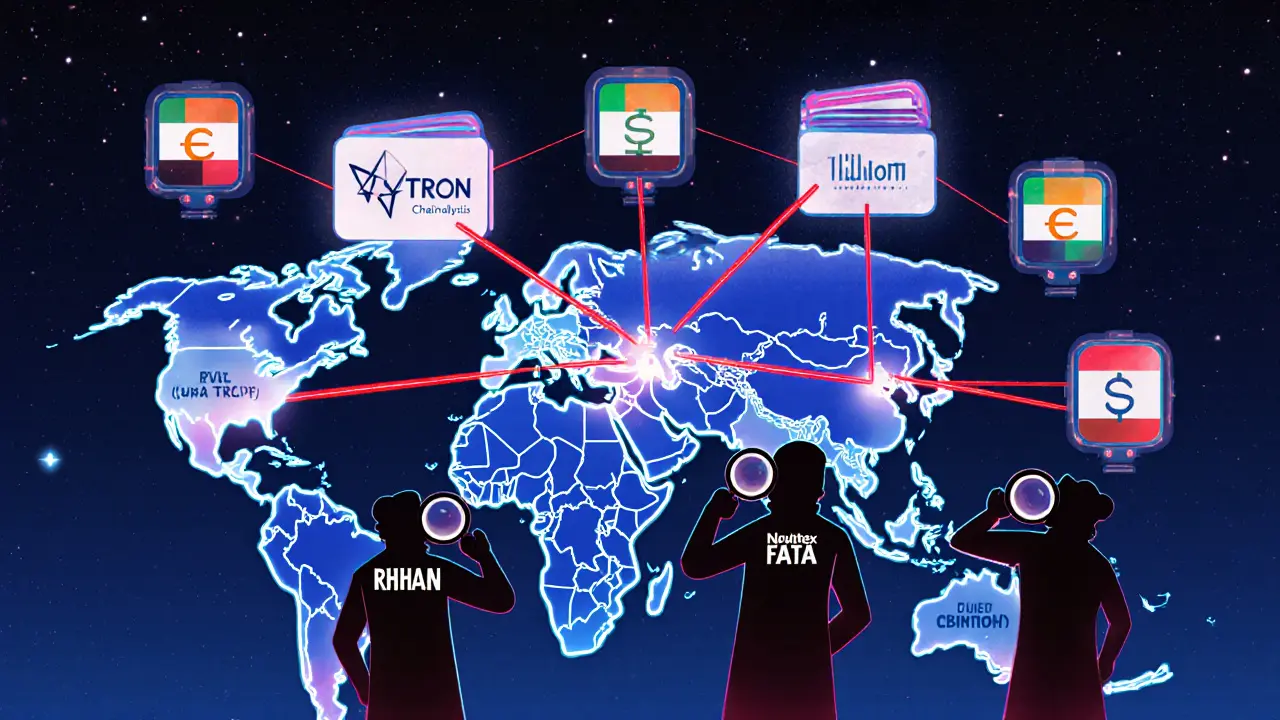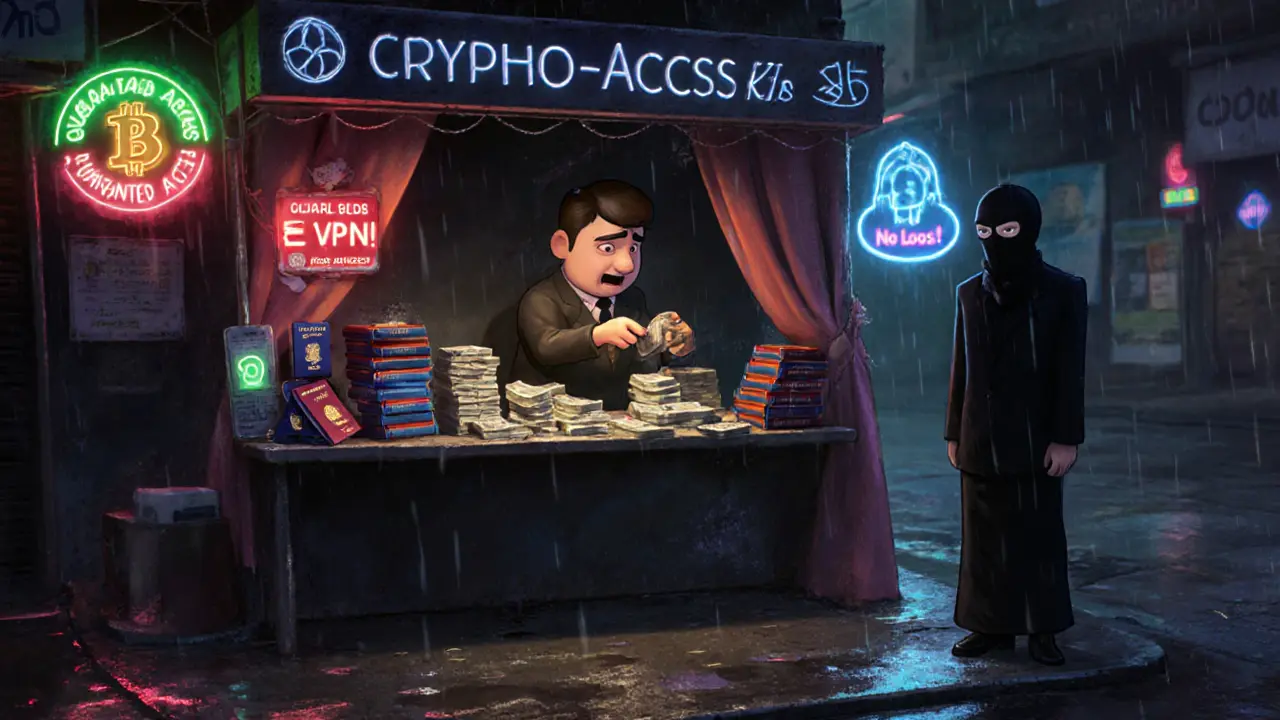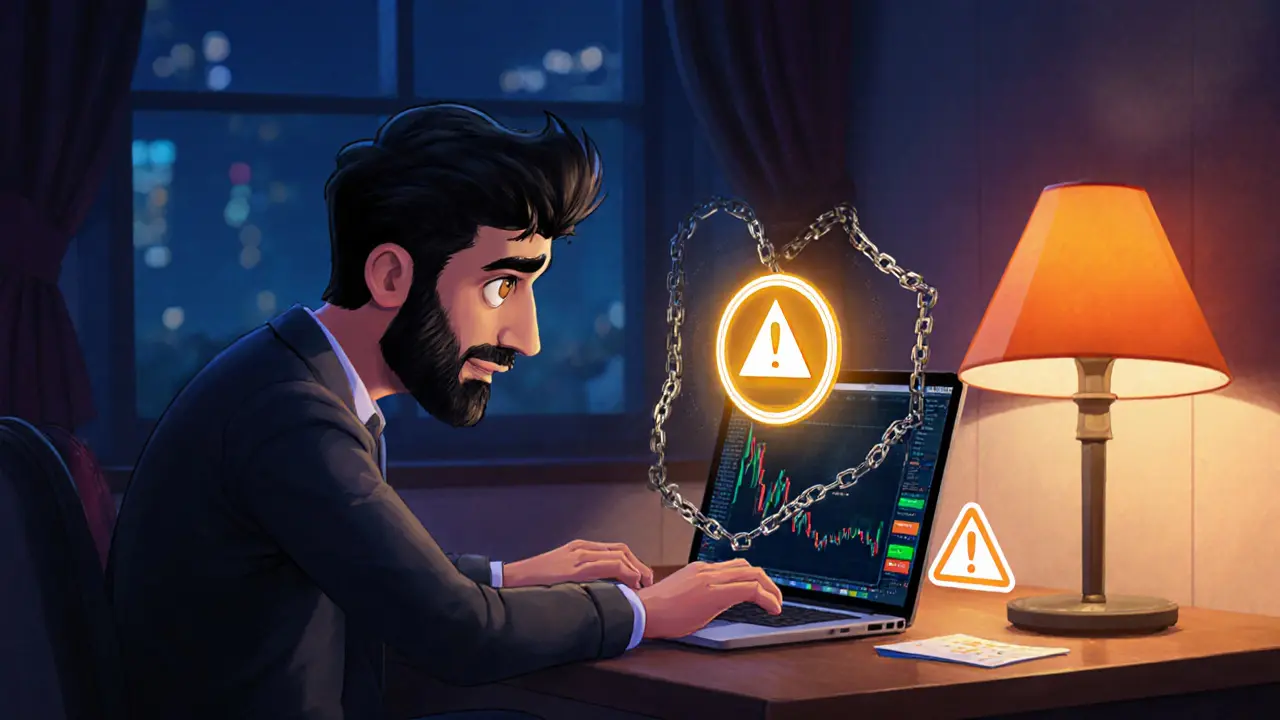Iran Crypto VPN Risk Calculator
Calculate Your Risk Level
Answer these questions to determine your exposure when using a VPN for crypto trading in Iran.
Why Iranians Use VPNs to Trade Crypto
In Iran, buying and selling cryptocurrency isn’t just a financial choice-it’s a necessity. With strict currency controls, inflation hitting over 40% in 2025, and local banks freezing accounts linked to crypto, Iranians turned to digital assets as a lifeline. But international exchanges like Binance, Kraken, and Coinbase block Iranian IP addresses. So people use VPNs. Not as a luxury, but as the only way to access global markets.
It’s not about anonymity for privacy’s sake. It’s about survival. Between January and July 2025, Iranians moved $3.7 billion in cryptocurrency. Most of it-over 87%-flowed through Nobitex, Iran’s biggest local exchange. But even Nobitex isn’t safe anymore. In October 2024, blockchain intelligence firms started targeting its users, freezing wallets and triggering mass account lockouts. That pushed more people to foreign exchanges. And that’s where the real danger begins.
The Hidden Risks of Using a VPN for Crypto
Not all VPNs are equal. Free ones? They’re traps. Many don’t encrypt data properly. Some sell your browsing history, IP logs, or even your transaction patterns to third parties. In Iran, where government agencies monitor crypto activity, that’s a direct path to being flagged.
Even paid VPNs can fail. If your connection drops mid-trade-say, during a withdrawal-you’re instantly exposed. Your real Iranian IP address shows up on the exchange’s servers. The system flags you. Your account freezes. Your coins disappear. People have lost tens of thousands of dollars in seconds because their VPN disconnected for three seconds.
Exchanges aren’t just checking IPs anymore. They use device fingerprinting-tracking your browser type, screen resolution, installed fonts, even how you type. They look at transaction timing: Do you always trade between 2 a.m. and 5 a.m. Tehran time? Do your withdrawals always go to the same TRON wallet? These patterns are easier to spot than you think.
How Exchanges Catch Iranian Users
It’s not magic. It’s data. Blockchain analytics firms like Chainalysis and Elliptic now have detailed maps of Iranian crypto flows. Over $2 billion of Nobitex’s $3 billion in 2025 volume moved through the TRON network. That’s a huge target. When transactions cluster around specific wallets, timestamps, or token types, it’s like a neon sign saying “Iranian activity.”
Even if you use a VPN, if your wallet has ever been linked to Nobitex, you’re on a watchlist. Once a wallet is tagged, any future transaction-even from a different IP-can trigger a freeze. That’s why so many Iranians are now using burner wallets. One for Nobitex. One for international exchanges. One for gas fees. But even that’s not foolproof.
And then there’s the human factor. Iranian traders often use fake IDs-foreign passports, fake residency papers, foreign SIM cards for OTPs-to bypass KYC. But if the name on your ID doesn’t match the email you used to sign up, or if your phone number is registered in Turkey but your transaction history shows Tehran time zones, it raises red flags. Exchanges have teams that cross-check these details daily.

The Underground Market for Crypto Circumvention
A black market has sprung up around this problem. In Tehran, you can now buy “crypto access kits” for $150-$300. These include: a foreign IBAN, a SIM card with a non-Iranian number, a scanned fake residency document, and a pre-configured VPN with auto-reconnect features. Some sellers even offer live support-someone who’ll help you log in, verify your identity, and complete your first trade.
But these services are risky. Many are scams. Others are fronts for surveillance. One trader in Mashhad lost $18,000 after paying for a “guaranteed” foreign ID. The person who sold it was working with Iran Cyber Police (FATA). He got the ID, the SIM, and the VPN-but the exchange flagged his account within hours. He was never told why.
Even legitimate providers are under pressure. In 2025, two major Iranian VPN services were shut down after being linked to crypto transfers. Their servers were seized. Their owners disappeared. Now, users are forced to rely on obscure, untested tools. Some use Tor. Others route traffic through multiple layers of proxies. But speed drops. Reliability plummets. And detection risk? It only goes up.
Why the Crackdown Is Getting Worse
The Iranian government doesn’t ban crypto outright. It bans unlicensed crypto activity. Licensed miners can sell their coins to the state. Banks can’t process crypto payments. But if you’re using a VPN to trade on Binance? That’s illegal. And enforcement is escalating.
In January 2025, over one million bank accounts were frozen for suspected crypto links. The Central Bank of Iran now requires financial institutions to flag any transaction that matches crypto-related keywords-even if it’s just a payment to a crypto exchange’s customer service email. The Ministry of Energy tracks electricity usage patterns to spot hidden mining rigs. FATA monitors social media for crypto discussions.
And internationally, the pressure is mounting. In late 2024, blockchain intelligence firms launched a bounty program offering cash rewards for identifying Iranian-linked wallets. The goal? Make it too risky for exchanges to serve Iranian users at all. Binance, which once allowed signups with just an email, now uses AI to detect Iranian behavior patterns. By September 2025, over 92% of Iranian IP attempts to access Binance were blocked before login.
What Happens When You Get Caught
There’s no jail sentence for using a VPN to trade crypto. But the consequences are just as brutal.
- Your exchange account is frozen. No appeals. No customer service. Just silence.
- Your funds are held indefinitely-or permanently.
- Your personal details (email, phone, IP) are shared with Iranian authorities.
- You may be contacted by FATA for “voluntary interviews.” Refusal can lead to travel bans or asset seizures.
One trader in Shiraz lost $42,000 in Bitcoin after his VPN dropped during a withdrawal. He spent six months trying to get help from Binance. No reply. He filed a complaint with Iran’s cyber police. They asked for his wallet address. He gave it. Two weeks later, his home internet was cut off. His phone was confiscated. He hasn’t traded since.

Alternatives Are Limited-and Risky Too
Some Iranians are turning to peer-to-peer (P2P) platforms like LocalBitcoins or Paxful. But these are slow, expensive, and full of scams. Others use Hamster Combat, a mobile game that rewards players with tiny amounts of cryptocurrency. It’s not a solution-it’s a workaround for people who can’t access real exchanges anymore.
Decentralized exchanges (DEXs) like Uniswap or PancakeSwap seem like a safe bet. But they require a crypto wallet. And if that wallet has ever been linked to an Iranian exchange-even years ago-it’s already flagged. Blockchain analytics don’t forget.
There’s no easy path. The tools that worked in 2020 don’t work in 2025. The cat-and-mouse game is over. The mice are losing.
What Traders Need to Know Now
If you’re in Iran and still trading crypto with a VPN, here’s what you need to do:
- Never use free VPNs. They’re not just slow-they’re dangerous.
- Use a VPN with kill-switch and obfuscation features. Test it daily.
- Never reuse wallets. Each exchange should have its own wallet.
- Avoid linking any personal info to your crypto accounts-not your real name, not your phone, not your email.
- Keep your transaction history offline. Never store it on cloud drives.
- Assume every transaction is being monitored. Act like you’re already under surveillance.
There’s no guarantee of safety. But these steps reduce your risk. The truth? The window for safe crypto trading in Iran is closing fast. In 2024, Iranians made $1.1 billion in crypto inflows in June. In June 2025? Less than $500 million. That’s a 55% drop in one year. And it’s still falling.
Is There a Future for Crypto in Iran?
Maybe. But not the way it was. The era of easy, anonymous trading is over. The future belongs to those who can adapt: decentralized systems, private blockchains, and offline methods that don’t rely on centralized exchanges. But for now, if you’re using a VPN to trade crypto in Iran, you’re playing a game with rules that change every week-and the house always wins.
Can I use a free VPN to trade crypto in Iran?
No. Free VPNs often lack proper encryption, log your activity, or sell your data to third parties. In Iran, where crypto activity is heavily monitored, using a free VPN increases your risk of being identified, tracked, and reported to authorities. Many free services are outright scams designed to steal crypto credentials.
What happens if my VPN disconnects during a crypto trade?
If your VPN drops while you’re sending or withdrawing crypto, your real Iranian IP address is exposed to the exchange’s monitoring system. Most exchanges will immediately freeze your account, often permanently. Your funds may be locked indefinitely, and your personal details could be shared with Iranian cyber police. Always use a VPN with a kill-switch to prevent this.
Why are Iranian crypto transactions being flagged even with a VPN?
Exchanges now use behavioral analysis, not just IP checks. They look at transaction timing (e.g., trades happening at Tehran hours), withdrawal destinations, device fingerprints, and wallet history. If your wallet was ever linked to Nobitex or another Iranian exchange-even years ago-it’s on a watchlist. A VPN hides your location, but not your digital footprint.
Are there any safe exchanges for Iranians to use?
No major international exchange currently offers safe, legal access to Iranians. Binance, Kraken, and Coinbase have hardened their systems since 2021. Even if you bypass geoblocking with a VPN, your account is likely flagged through behavioral patterns or wallet history. The safest option is avoiding exchanges entirely and using decentralized, peer-to-peer methods-but those come with high scam risk.
Can Iranian authorities track my crypto wallet if I use a VPN?
Yes. Blockchain is public. If your wallet address has ever been used on an Iranian exchange like Nobitex, or if your transactions follow patterns common to Iranian users (e.g., large TRON transfers at specific times), blockchain analytics firms can link it to you-even if you’re using a VPN. Iranian cyber police work with international firms to identify these wallets. Once flagged, your address is tracked forever.
Is it legal to use a VPN for crypto in Iran?
Using a VPN itself isn’t illegal in Iran, but using it to access foreign crypto exchanges violates multiple laws, including the Central Bank’s ban on unlicensed digital asset transactions and cybercrime regulations enforced by FATA. While few individuals are jailed for this, accounts are frozen, assets seized, and users pressured into cooperation. The legal gray area is shrinking rapidly.
How much crypto did Iranians trade in 2025?
Between January and July 2025, Iranians moved approximately $3.7 billion in cryptocurrency. That’s an 11% drop from the same period in 2024. The sharpest declines came after April 2025, when blockchain monitoring intensified. In July 2025 alone, crypto inflows dropped over 76% compared to July 2024, showing the growing impact of detection and enforcement.

Lisa Hubbard
November 22, 2025 AT 21:30Julissa Patino
November 23, 2025 AT 01:48Omkar Rane
November 24, 2025 AT 20:21Daryl Chew
November 25, 2025 AT 12:03Gus Mitchener
November 26, 2025 AT 23:30Soham Kulkarni
November 28, 2025 AT 07:16Tejas Kansara
November 29, 2025 AT 04:27Rajesh pattnaik
November 29, 2025 AT 09:56Belle Bormann
November 29, 2025 AT 17:10Dave Sorrell
November 30, 2025 AT 18:25Sky Sky Report blog
December 2, 2025 AT 11:34stuart white
December 2, 2025 AT 21:13Jenny Charland
December 4, 2025 AT 04:50preet kaur
December 4, 2025 AT 22:28Emily Michaelson
December 6, 2025 AT 10:12